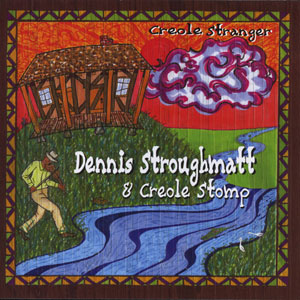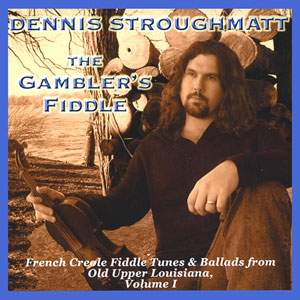Dennis Stroughmatt
“Creole Fiddler & Cultural Ambassador of Upper Louisiana”
Quick Intro
Dennis Stroughmatt is a French-speaking fiddler, vocalist, and historian whose work spans Cajun, Creole, Western Swing, and the rare Illinois-Missouri French traditions of “Upper Louisiana.” With recordings on Swallow and Maison de Soul, and performances from Prairie Home Companion to Preservation Hall, Stroughmatt has become a nationally recognized ambassador of French-rooted American music.
In-Depth Profile
Raised in southeastern Illinois, Stroughmatt was mentored by Missouri Creole fiddlers Roy Boyer and Charlie Pashia, and later studied with Cajun legends like Hadley J. Castille. He became an adopted son of the French Midwest Creoles, performing at house parties (“bouillons”) and learning the Illinois French dialect. His musical journey led him to Louisiana, Quebec, and Tennessee, where he deepened his study of French-rooted fiddle styles.
Stroughmatt formed the band Creole Stomp, which blends Cajun, Creole, and Zydeco influences with Western Swing and honky-tonk flair. His recordings include The Gambler’s Fiddle (Swallow SW-6195), Cadet Rouselle (Swallow SW-6210), and Le Tracas de Morris with Morris Ardoin (Maison de Soul MDS-1083). His performances have been featured on NPR, PBS, CNN, and at major festivals across North America.
In 2023, Stroughmatt was awarded the Médaille d’Or du Rayonnement Culturel by the Ambassador of France and La Renaissance Française for his work in preserving IL-MO French music and culture. He continues to teach, record, and perform, bridging the gap between Upper and Lower Louisiana traditions with passion and precision.
Signature Tracks
-
“Le Tracas de Morris” — A haunting accordion-fiddle duet with Morris Ardoin, rich in Creole phrasing
-
“Cadet Rouselle” — A playful French folk tune reimagined with Cajun swing and fiddle fire
-
“Creole Stranger” — A moody original composition blending blues, folklore, and prairie mystique
Notable Accomplishments & Awards
-
Swallow Records Releases — The Gambler’s Fiddle (SW-6195), Cadet Rouselle (SW-6210), La Belle Blondine Vol. 3 (SW-6223)
-
Maison de Soul Collaboration — Le Tracas de Morris with Morris Ardoin (MDS-1083)
-
Médaille d’Or du Rayonnement Culturel — Awarded by the Ambassador of France in 2023
-
CFMA Nominee — Enfin…At Last nominated Best Album by a Cajun/Creole band based outside Louisiana (2003)
-
Featured on PBS, NPR, CNN, and Prairie Home Companion
-
Inducted into the National Oldtime Fiddlers Hall of Fame
Bonus Notes
-
Stroughmatt holds an MA in history and a Certificate of French Quebecois Studies, blending scholarship with performance
-
He leads music camps and workshops across the Midwest, teaching Cajun, Creole, and Western Swing styles to all ages
Album Reviews
Creole Stranger & Le Tracas de Morris
BluesRag Magazine — Written by Dennis Rozanski
“Cut after cut crystallizes into an instant party – without ever intentionally trying.”
Somehow, all of life’s joys and bitter sweetness get seemingly compressed into the rough-cut gems that are Creole accordion-fiddle tunes. Take the legendary duo of “Bois Sec” Ardoin and Canray Fontenot, whose squeeze-and-saw attack could alone do more emotionally than full bands could muster with all of the additional horsepower. That famed team, however, belongs to the ages. Thankfully then, at age 70, Morris Ardoin is still mining those rustic diamonds, just like his father did. And having hooked up in collaboration with fiddler/vocalist Dennis Stroughmatt, a similar two-man rapport is developing. At long last, Le Tracas de Morris is viable, danceable proof. They immediately engage, like sparring serpents – twisting, turning, entwining, looping, and re-looping around each other’s lines. It’s all in the moment too, with Morris calling audibles right there on the line behind his heaving accordion, flashing his partner the “go” sign for flying off on another solo. Their French hollers manage to squeeze out some extra mourn for a blues or stretch for that added shot of fire on a two-step. Sometimes the clang of a triangle will chime along, and the acoustic chop of guitar makes frequent rhythmic accompaniment. Yet it’s the Ardoin-Stroughmatt engine that throws the sparks from “Le Blues a Whiskey” until finally flickering out on the wheezy vamp through the “Bars Of the Prison’s” first gear grind. There’s a whole neo-traditional camp of young bloods who painstakingly study and strive to achieve for what passes as something so naturally effortless as breathing for Mister Morris. Cut after cut crystallizes into an instant party – without ever intentionally trying.
Left to his own devices, Dennis Stroughmatt tends to refurbish old Creole and Cajun tunes with a fresh coat of paint and some updated bodywork. So Amede Ardoin’s age-old “Blues a Basile” gets massively inflated into something worthy of any booming dancehall. Nathan Abshire’s newly redesigned “Bayou Teche Blues” cranks over well. “Suzy Q” shoves along with tremendous new-found momentum beyond Boozoo Chavis’ original means. Even the blues standard “Baby Please Don’t Go” becomes re-colored in murkier, spookier shades than Big Joe Williams could have dreamed. But the Illinois native can also solidly build his own compositions from traditional and contemporary parts. Both a snaking “Morris Ardoin Blues” tribute and the mood piece which lurks somewhere ’round midnight, “Creole Stranger”, confirm that. To make it all happen, Stroughmatt himself pulls double duty on both lead accordion and fiddle in his forward-thinking crew, Creole Stomp. Electric guitars slide, slur, peck, and twang. Big basslines go bump through the night. And, for added oomph, both drumkit and a tireless rubboard provide double-barreled kick. There’s no shortage of power or drive for their debut collective work. That’s made especially evident when barren songs introductions literally explode behind the punch of a band in full roar. Clifton Chenier’s “I’m Coming Home” and the swamp-pop ballad treatment of “This Burning Desire” finally afford dancers the greatest chance to catch a breather and nuzzle close.
Long Roads and Bloodshot Eyes
Dirty Linen — Written by Paul Emile Comeau (April/May 2008)
“Something a little different, but worth a listen for any music lover with an open mind.”
Dennis Stroughmatt is a fiddler/accordionist/singer who leads two groups. Creole Stomp plays mostly Cajun and Zydeco music, while Esprit Creole specializes in French Creole fiddle tunes and ballads from Old Upper Louisiana (the Missouri-Illinois region). Long Roads and Bloodshot Eyes, his third album for Swallow, features the former group but also points to a new direction for Stroughmatt in the sense that the album contains largely original material. The exceptions are Fats Domino’s “Good Hearted Man,” Boozoo Chavis’ “Johnny Billy Goat,” Dewey Balfa’s “Parlez nous a boire,” and a couple of Morris Ardoin tunes. Also, unlike his previous albums, nearly half the material on this album is sung in English. The album closes with a cover of Johnny Paycheck’s “Apartment #9,” a track that demonstrates that Stroughmatt’s versatility extends to Country music.
Cadet Rouselle
The Geezer Music Club — Written by The Big Geez (July 2008)
“Stroughmatt’s versatility extends from Cajun to Country music.”
It’s a pretty safe bet that this is the only review you’ll read today for an album of music inspired by early French Creole settlers in an area of Southern Illinois and Missouri once known as Upper Louisiana. Cadet Rouselle, newly issued on the Swallow Records label, is the latest musical expression from Dennis Stroughmatt, who has spent years bringing the sounds of early Americana – especially that with a French twist – to listeners.
Stroughmatt is a well-known and highly respected musician who has performed regionally and nationally with his group, Creole Stomp, entertaining audiences with some outstanding swamp music in all varieties. But even though he’s completely at home with Cajun and Zydeco, this album follows up on 2006’s Gambler’s Fiddle, and continues his quest to recognize the music of early French settlers in his home area of Upper Louisiana.
He’s joined by his wife Jennifer, who is a skilled multi-instrumentalist and singer herself, and several other accomplished musicians. Included among them is bassist Bob Krumm and banjoist Jon Watson, both from Creole Stomp.
The music itself is often reminiscent of – and in some cases, nearly identical to – Cajun music, and shares many of the same characteristics, so fans of that genre will find the album very listenable. Some of the tracks are a little different though, with a soft and lilting sound that might give the listener something new to experience.
A good example is “Isabeau se Promene,” which sounds almost like a medieval ballad from the old country, and “Marie Madeleine,” a piece that features some especially nice vocals by Stroughmatt. Singing in French, he is obviously at home with the music and his strong, reedy but confident voice rings true.
Some of the livelier pieces are more reminiscent of Cajun music, but there’s certainly nothing wrong with that — Stroughmatt and his band thrive on that type of music. Especially enjoyable were “Les prisons de Nantes,” and “La pommier d’un Ange,” an instrumental that features a strong lead from the star’s fiddle.
Something a little different, but worth a listen for any music lover with an open mind. (That’s you, right?)


